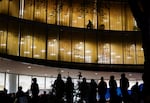Portland State University’s response to the appearance of anti-Palestinian fliers inside a campus building over the summer may have been a violation of Title VI, a section of federal civil rights law that protects students from discrimination based on race, color or national origin.

A small group of Portland State University students, alums and supporters march around the block, near the PSU Administration building, Oct. 7, 2024.
Kristyna Wentz-Graff / OPB
PSU was notified on August 15 that the U.S. Department of Education’s Office of Civil Rights had opened an investigation into the summertime incident.
Posters with Islamophobic and anti-Palestinian phrases and photographs began to appear inside PSU’s Cramer Hall throughout July and early August this year. Some fliers were posted on the building’s entryway doors facing Southwest Broadway.
“There were instances where fliers were posted more than once per day so people were taking them down and [the fliers] were going back up,” said Stéphanie Wahab, a Portland State professor in the School of Social Work. “The posters were incredibly racist towards Palestinians.”
Wahab, who is a member of PSU Faculty and Staff for Justice in Palestine, said the university took too long to address the situation and alert the wider campus community. Wahab said it was individual students and faculty who took down most of the offensive posters.
More than a month later, on Sept. 13, Portland State President Ann Cudd addressed the incident in a blog post.
“The contents of the fliers were derogatory and vile. They were removed as soon as they were discovered and reported to the Office of Equity and Compliance, which, in partnership with Facilities and the Campus Public Safety Office, conducted a full investigation,” said Cudd in the post. “The responsible individual was identified and the university took appropriate action to address the misconduct.”
In an emailed statement a PSU spokesperson said the university treats all bias-related incidents with the utmost seriousness and recognizes that those actions harm the community and are contrary to Portland State’s core values of inclusivity and respect.
The university said it is cooperating with federal investigators.
What is Title VI?
Title VI is a key part of the Civil Rights Act of 1964.
“It was the part of the law that addressed education and prohibited discrimination on the basis of race, color, national origin, shared ancestry and ethnic characteristics,” said Paula A. Barran, partner and higher education chair at the Portland-based law firm Barran Liebman LLP. “Title VI was a big education leveler, in terms of nondiscrimination.”
Any higher education institution that receives federal financial aid, like Pell Grants or federal student loans, must comply with Title VI. To be in compliance with that law, K-12 schools, colleges and universities must address any discriminatory incidents in a timely manner and take steps to prevent a similar event from happening again.
Several colleges and universities across the country have been hit with Title VI investigations over the past year. The Education Department’s Office for Civil Rights has opened more than 90 Title VI national origin discrimination investigations at postsecondary schools across the U.S. The vast majority of those cases started after Oct. 7, 2023, when Hamas’ attack against Israel started an ongoing war that has killed thousands, the majority in Gaza.
Barran said the rise in Title VI cases over the last year is not surprising.
“I think we’re seeing more now because of what’s happening in the Middle East and the very strong feelings that many people in this country have on one side or the other,” said Barran. “There is a war going on, and many people are dying, so the passions run high and those get played out.”
Portland State is the only school in Oregon with an open Title VI case.

A small crowd stands outside the occupied Branford Price Millar Library at Portland State University, April 30, 2024. Many students reported not feeling safe on campus after the Spring protests.
Kristyna Wentz-Graff / OPB
The many protests at college campuses over the war in Gaza last school year also gave rise to an increase in antisemitism and Islamophobia, including at PSU. The demonstrations and occupation of the Branford Price Millar Library at Portland State in the spring left many faculty, staff and students deeply divided. People of both Jewish and Palestinian descent reported they did not feel safe on campus.
A press statement from the Council on American-Islamic Relations welcomed the Title VI investigation at Portland State. Last month, the Muslim civil rights group called on higher education institutions to better protect students who advocate against genocide.
In response to the widespread campus protests, the Education Department’s Office of Civil Rights released updated Title VI guidance in May. The guidance offers some clarity on how to interpret and follow the law. But Barran said higher education leaders are still left to manage the delicate balance between supporting First Amendment rights and following civil rights law.
“You’re constantly refereeing just how far you can go and trying to remember that you’re not supposed to be regulating speech based on its content,” said Barran. “It’s hard to see the way clear on this.”
